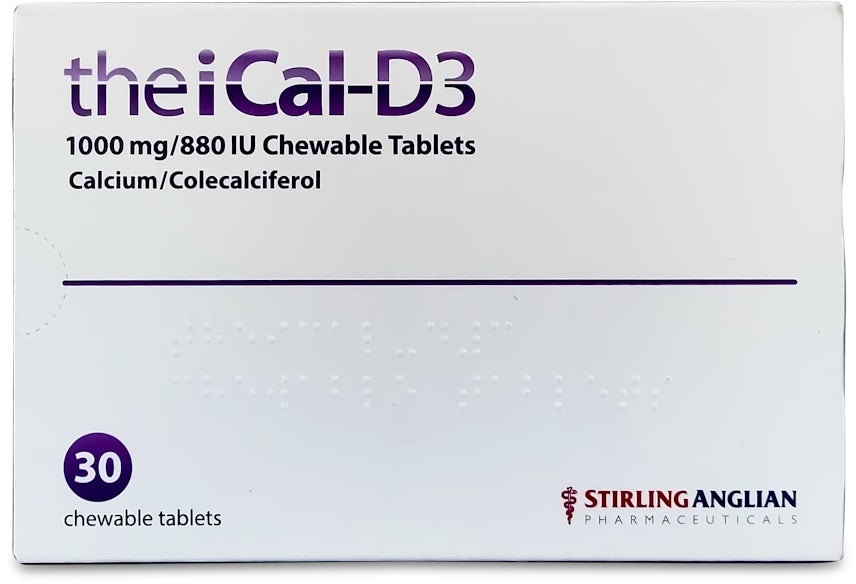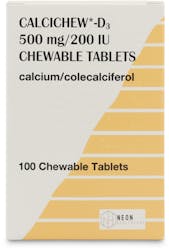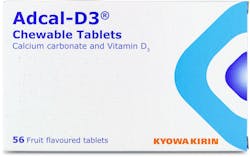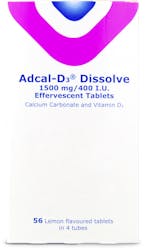theiCal-D3 1000mg/880IU 30 Chewable Tablets
theiCal-D3 1000mg/880IU 30 Chewable Tablets
What 500,000+ customers say about medino:
Description
TheiCal-D3 1000 mg / 880 IU chewable tablets provide a powerful calcium and vitamin D3 supplement designed to support bone health and cellular function. This unique combination is tailored to cater to the needs of individuals aiming to maintain an active lifestyle and achieve optimum health. Specifically formulated for the elderly, these tablets aid in preventing and treating calcium and vitamin D deficiencies, while also serving as a valuable support in the management of osteoporosis.
Contained in a single tablet are 1000 mg of calcium and 880 IU of vitamin D, offering a convenient solution to achieve the recommended daily intake of these essential nutrients. Calcium plays a crucial role in maintaining strong bones, while vitamin D regulates cell growth and development. TheiCal-D3 tablets ensure that users receive adequate amounts of these vital nutrients without any hassle.
In addition to their health benefits, TheiCal-D3 chewable tablets boast a delightful orange flavour, making them enjoyable to consume. The tablets can be taken independently, without the need for food or drink, and are suitable for consumption at any time and place. Moreover, these sugar-free tablets pose no risk of tooth decay or cavities, ensuring that users can maintain their health without compromising their dental hygiene.
Ingredients
Active Ingredients: Calcium and colecalciferol. Each chewable tablet contains 2,500mg of calcium carbonate (equivalent to 1,000mg of calcium) and 8.8mg of colecalciferol concentrate (powder form) (equivalent to 22 micrograms of colecalciferol = 880IU of vitamin D3).
Other Ingredients: Isomalt (E953), xylitol, sorbitol (E420), citric acid, anhydrous, sodium dihydrogen citrate, magnesium stearate, carmellose sodium, flavour orange “CPB” and flavour orange “CVT” (which both contain sorbitol (E420)), aspartame (E951), acesulfam potassium, sodium ascorbate, all-rac-alpha-tocopherol, modified (maize) starch, sucrose, triglycerides medium chain and silicon dioxide colloidal.
Usage and Instructions
You can take TheiCal-D3 1000mg / 880IU chewable tablets at any time, with or without food.
Please notice that oxalic acid (contained in spinach and rhubarb) and phytic acid (contained in wholegrain cereals) can reduce the amount of calcium you absorb in your bowel. In the 2 hours before or after eating food containing high amounts of oxalic or phytic acid patients should not take medicinal products that contain calcium.
Always take TheiCal-D3 1000mg / 880IU chewable tablets exactly as described in this leaflet. You should check with your doctor or pharmacist if you are not sure.
Adults and elderly:
take 1 chewable tablet daily (corresponding to 1,000mg of calcium and 880IU (International Units) of vitamin D3).
Pregnant women:
take only half a chewable tablet daily (corresponding to 500mg of calcium and 440IU (International Units) of vitamin D3). The daily dose of half a tablet must not be exceeded.
The tablet has to be chewed before it is swallowed. It should be taken at any time, with or without food.
TheiCal-D3 1000mg / 880IU chewable tablets should be taken as long-term treatment. Talk to your doctor how long you should take TheiCal-D3 1000mg / 880IU chewable tablets (see also section 2, Take special care with TheiCal-D3 1000mg / 880IU chewable tablets).
If you take more TheiCal-D3 1000mg / 880IU chewable tablets than you should Overdose of TheiCal-D3 1000mg / 880IU chewable tablets may lead to symptoms such as feeling sick (nausea), vomiting, thirst or excessive thirst, increased urine output, depletion of body fluids or constipation.
If an overdose is suspected, contact your doctor or pharmacist immediately.
If you forget to take TheiCal-D3 1000mg / 880IU chewable tablets, take it as soon as you remember.
However, do not take a double dose to make up for a forgotten tablet.
If you wish to interrupt or prematurely discontinue the treatment, please consult your doctor.
If you have any further questions on the use of this product, ask your doctor or pharmacist.
Keep out of the reach and sight of children.
Warnings
Do not take TheiCal-D3 1000mg / 880IU chewable tablets:
- If you are allergic (hypersensitive) to calcium, vitamin D3 or any of the other ingredients of TheiCalD3 1000mg/880IU chewable tablets
- If you have high levels of calcium in your blood (hypercalcaemia)
- If you have increased excretion of calcium with your urine (hypercalciuria)
- If you suffer from overactive parathyroid glands (hyperparathyroidism)
- If you suffer from bone marrow cancer (myeloma)
- If you suffer from cancer that has affected your bones (bone metastases).
- If you have a restraint of the limbs (prolonged immobilisation) accompanied with hypercalcaemia and/or hypercalciuria
- If you have kidney stones (nephrolithiasis)
- If you have calcium deposits in your kidneys (nephrocalcinosis)
- If you suffer from an excessive supply of vitamin D (hypervitaminosis D)
- If you have severe kidney problems
Take special care with TheiCal-D3 1000mg / 880IU chewable tablets:
During long-term treatment the levels of calcium in your blood and urine and your kidney function have to be monitored regularly.
This is especially important if you have a tendency to develop kidney stones. Depending on your blood levels your doctor might reduce the dosage or discontinue the treatment.
If you are simultaneously being treated with cardiac glycosides or thiazide diuretics (water tablets) for heart problems the levels of calcium in your blood and urine and your kidney function have to be monitored regularly. Depending on your blood levels your doctor might reduce the dosage or discontinue the treatment.
If you suffer from kidney problems you have to take TheiCal-D3 1000mg / 880IU chewable tablets with special care. Your calcium levels of the blood and urine have to be checked. If you suffer from severe kidney problems, use other forms of vitamin D than cholecalciferol.
Take additional supplementation of calcium and vitamin D only under medical supervision and your doctor will require frequent monitoring of the calcium levels in the blood and urine.
Take special care when taking TheiCal-D3 1000mg / 880IU chewable tablets if you suffer from sarcoidosis (an immune system disorder which may affect your liver, lung, skin or lymph nodes).
There is a risk that the effect of this medicinal product gets too strong which can result in an overdose of calcium in the body. The levels of calcium in the blood and urine have to be monitored.
If you are immobile and are suffering from osteoporosis this medicinal product has to be used with special care, as the level of calcium in your blood might increase.
TheiCal-D3 1000mg / 880IU chewable tablets are not intended for use in children and adolescents.
Please tell your doctor or pharmacist if you are taking or have recently taken any other medicines, including medicines obtained without a prescription.
In the case of simultaneous treatment with digitalis glycosides (cardiac glycosides derived from foxglove), cardiac arrhythmias can occur. Rigorous medical monitoring including an ECG and measurement of the blood calcium level is therefore necessary.
In the case of simultaneous administration of diuretics of the thiazide drug class (also called water tablets), the blood calcium level should be regularly monitored since thiazides decrease the excretion of calcium in the urine.
The absorption and thus also the effectiveness of certain antibiotics (called tetracyclines) are decreased by the simultaneous administration of TheiCal-D3 1000mg / 880IU chewable tablets.
These drugs should be taken at least 2 hours before or 4-6 hours after TheiCal-D3 1000mg/880IU chewable tablets.
Furthermore, other medicines such as sodium fluoride (used to strengthen the tooth enamel or to treat osteoporosis) and bisphosphonate (used to treat osteoporosis) drugs are affected by interactions.
These products should therefore be taken at least 3 hours before TheiCal-D3 1000mg/880IU chewable tablets.
As long an interval as possible should be left between the administration of cholestyramine (a product to lower raised cholesterol levels) or laxatives such as liquid paraffin and TheiCal-D3 1000mg/880IU chewable tablets since otherwise vitamin D is not absorbed properly.
The simultaneous administration of TheiCal-D3 1000mg/880IU chewable tablets and phenytoin (a product for the treatment of epilepsy) or barbiturates (hypnotics) can result in a reduction in the effect of vitamin D.
The simultaneous administration of TheiCal-D3 1000mg / 880IU chewable tablets and glucocorticoids (eg: cortisone) can result in a reduction in the effect of vitamin D and to a decreased calcium level in the blood.
The additional supplementation of calcium and vitamin D should be given only under medical supervision and will require frequent monitoring of the calcium levels in the blood and urine.
Calcium can reduce the effect of levothyroxine (used to treat thyroid deficiency). For this reason, levothyroxine should be taken at least four hours before or four hours after TheiCal-D3 1000mg/880IU chewable tablets.
The effect of quinolone antibiotics may be reduced if taken at the same time as calcium. Take quinolone antibiotics two hours before or six hours after taking TheiCal-D3 1000mg/880IU chewable tablets.
Ask your doctor or pharmacist for advice before taking any medicine.
If you are pregnant you may use TheiCal-D3 1000mg / 880IU chewable tablets in case of a calcium and vitamin D deficiency.
The daily dose of half a tablet must not be exceeded. During pregnancy the total daily amount of calcium should not be higher than 1,500mg and the total daily amount of vitamin D3 should not be higher than 600IU (International Units).
Long-term overdose of calcium and vitamin D during pregnancy must be avoided since this may lead to high levels of calcium in the blood and may have a negative effect on the unborn child.
TheiCal-D3 1000mg / 880IU chewable tablets can be used during breast-feeding. As calcium and vitamin D pass into breast-milk check with your doctor first if your child receives any other products containing vitamin D.
TheiCal-D3 1000mg / 880IU chewable tablets has no influence on your ability to drive and use machines.
Important information about some of the ingredients of TheiCal-D3 1000mg / 880IU chewable tablets.
This medicine contains aspartame (E951), a source of phenylalanine which may be harmful for people with phenylketonuria.
This medicine also contains sorbitol (E420), isomalt (E953) and sucrose. If you have been told by your doctor that you have an intolerance to some sugars, contact your doctor before taking this medicine.
Like all medicines, TheiCal-D3 1000mg / 880IU chewable tablets can cause side effects, although not everybody gets them.
Stop taking TheiCal-D3 1000mg / 880IU chewable tablets and contact a doctor immediately if you experience the following allergic reaction (not known as frequency cannot be estimated from the available data):
swelling of the face, lips, tongue or throat with sudden difficulty breathing and severe rash. The other side effects reported are:
Rare side effects:
feeling sick (nausea), diarrhoea, abdominal pain, constipation, wind, bloating (abdominal distension). rash, itching, hives. Uncommon side effects:
high levels of calcium in your blood (hypercalcaemia) or urine (hypercalciuria). If any of the side effects gets serious, or if you notice any side effects not listed in this leaflet, please tell your doctor or pharmacist.
Keep out of the reach and sight of children.
Do not use TheiCal-D3 1000mg/880IU chewable tablets after the expiry date (EXP) which is stated on the carton and on the tablet container or on the laminated aluminium paper foil. The expiry date (EXP) refers to the last day of that month.
Side Effects
Stop taking TheiCal-D3 1000 mg / 880 IU chewable tablets and contact a doctor immediately if you experience the following allergic reaction (not known as frequency cannot be estimated from the available data):
- Swelling of the face, lips, tongue or throat with sudden difficulty breathing and severe rash.
The other side effects reported are:
Rare side effects:
Feeling sick (nausea), diarrhoea, abdominal pain, constipation, wind, bloating (abdominal distension). rash, itching, hives.
Uncommon side effects:
High levels of calcium in your blood (hypercalcaemia) or urine (hypercalciuria). If any of the side effects gets serious, or if you notice any side effects not listed in this leaflet, please tell your doctor or pharmacist.






